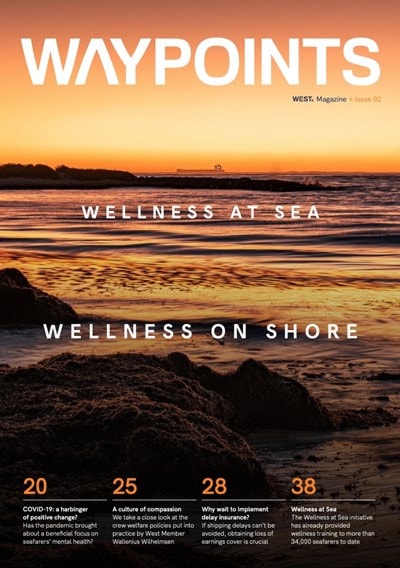A Culture of Compassion
West Member Wallenius Wilhelmsen has a strong reputation for supporting its crew members. Waypoints takes a closer look at the company’s crew welfare policies.
Kristin Schjødt Bitnes
General Counsel in Wallenius WilhelmsenASA and member of the advisory Board of West of England
Wallenius Wilhelmsen controls 130 vessels which operate on 15 trade
routes to six continents, and its workforce encompasses an estimated 2,700 seafarers. However, one of the most impressive statistics of all is that its crew retention rate is a massive 99.7%.
COVID-secure
For crew members prevented from leaving their vessels because of regional restrictions and company policies, Wallenius Wilhelmsen supplied extra bandwidth for satellite communications, enabling them to stay in touch with loved ones on land. Conversely, there was an issue with relief crews stuck at home: “The challenge is that many seafarers aren’t permanent employees,” says Capt. Svensson, “which means they don’t get a rolling salary; if you’re on board, you earn money. If you’re at home, you don’t.
As a means of making cargo transfer operations in port as COVID-secure as possible, a ship-shore safety checklist was drawn up for vessel and terminal operators
Best practices
Wallenius Wilhelmsen and several othermembers of the NSA (in tandem with the IMO) have been influencing authorities in different countries to align local rules, accommodating crew welfare elements such as limiting time on board and maximising the potential for changeovers, etc. Here again, the focus on mental health is paramount. “We have had a few cases where crew members have exhibited the onset of mental problems,” reflects Capt. Svensson. “I think people have become better at detecting those small nuances: we’ve had a lot of training on this in officer and crew seminars. In the cases we’ve had, we’ll have meetings with the relevant persons online, making sure they’re being properly taken care of and not being left on their own. We’ll also seek advice from local physicians and try to get those crew members ashore as soon as possible.”
Health insurance
Wallenius Wilhelmsen also supports its crews by paying for a health insurance scheme which covers families with up to four children. “Since we buy the insurance in such large volume, we get very low premiums,” Capt. Svensson explains. “As an example, let’s say we pay $500 a year: but if any individual took out that insurance, it would cost them $5,000. It’s reassuring, therefore, for them to know that if something happened to them on board, their family would be well looked after.”
The company has even set up its own vaccination program for seafarers in Baltimore. “Some of our local employees had family members who worked at the hospital,” Capt. Svensson adds, “so we set up an agreement with them to come on board and vaccinate all the crew. We’ve paid for between 800 and 900 crew to be vaccinated just in Baltimore alone, and that has been extremely appreciated by crew members from countries such as the Philippines, India and Myanmar, where the rate of vaccination is extremely slow. We have also lobbied the WHO very strongly to make seafarers among the first to get vaccinated in these countries.”
The example set by the likes of Wallenius Wilhelmsen is driving a wider understanding of the vital role played by seafarers, who enable the international trading of food, medicines and countless other commodities to continue. Global trade and the lifestyle we all enjoy depends on them.
